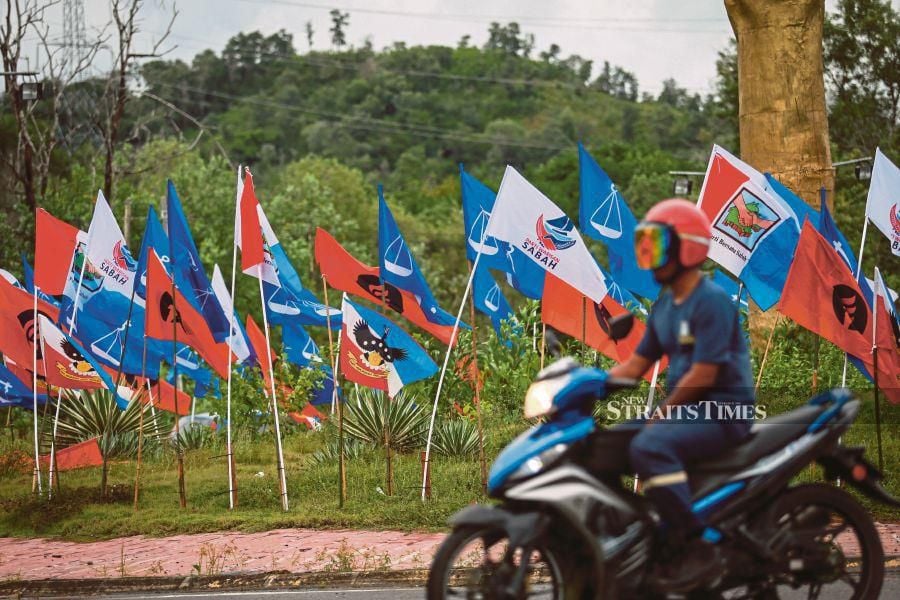
KUALA LUMPUR: The competition among Sabah-based political parties, particularly Parti Solidariti Tanah Airku (STAR), the United Progressive Kinabalu Organisation (Upko) and Parti Bersatu Sabah (PBS), in the 16th Sabah election may see their importance diminish in the eyes of Kadazan Dusun Murut voters.
Universiti Malaysia Sabah academician Dr Romzi Ationg said as the parties geared up to compete with one another, and for that reason, the voters from the community might no longer be interested in them.
"The supporters of those parties are declining due to several reasons, namely leadership factor and voters' loss of confidence. In terms of leadership, this is because each party and its leadership seem to be too focused on their own interests rather than the Kadazan Dusun Murut community.
"Before this, their ideologies very much focused on the people and ensured that the state's (cherished) autonomy would be eventually implemented.
"However, based on the current situation, that is not the case in the view of the voters," he told the New Straits Times.
Instead, Romzi said, voters had become interested with other Kadazan Dusun Murut-based parties.
"Hence, it will dilute the support of the community and reduce the importance of the three political parties in their eyes."
Asked if the voters would shift their votes to other parties like Parti Cinta Sabah (PCS) helmed by former foreign minister Datuk Seri Anifah Aman, Romzi said: "Although not necessarily that voters will turn towards the party, given that the party is contesting in all 73 state seats, it portrays that the party is determined that it will walk the talk.
"PCS said it wanted to pursue state autonomy and to do so, it must contest all the state seats. It seems that only PCS is doing so compared with the others, except for Warisan Plus and Gabungan Rakyat Sabah."
He said the confidence among the PCS rank-and-file seemed to be increasing as they competed in all seats and probably would be able to gain a few seats in the state polls.
Political analyst Associate Professor Dr Awang Azman Awang Pawi said every party had its core followers, hence it would not dilute the support or reduce the importance of the respective parties in the eyes of the Kadazan Dusun Murut community.
"Furthermore, the family factor influences the voting pattern in Sabah. If you have large families or connections in the area that you are set to contest, then you have the advantage.
"Another factor is political patronage. Take, for example, the Upko candidate. The people will look at who the candidate's big boss is. In this case, it is Datuk Seri Mohd Shafie Apdal, who is very popular in Sabah."
A total of 447 candidates will contest in 73 state assembly seats in the state polls.
The election will not see any straight fights. The most intense battle involves an 11-cornered fight for the Bengkoka state seat.
The multi-cornered fights comprise three-cornered (three), four- cornered (five), five cornered (15), six-cornered (26), seven-cornered (13), eight-cornered (six), nine-cornered (three), and 10-cornered (one) and 11-cornered (one). The 11-cornered tussle is for the Bengkoka seat, which falls under the Kudat parliamentary seat, while the 10-cornered contest is for the Inanam seat under the Sepanggar parliamentary constituency.
The number of independent candidates is 56, while the breakdown of nominees from parties is led by Perikatan Nasional at 29, Parti Gagasan Rakyat Sabah (28), Parti Perpaduan Rakyat Sabah (23), Parti Bersatu Sabah (22), Upko (12), PKR (seven), Parti Harapan Rakyat Sabah (five), Parti Kerjasama Anak Negeri (two), Parti Amanah Negara (one), Parti Kebangsaan Sabah (one) and Pertubuhan Perpaduan Rakyat Kebangsaan Sabah (one).
The Election Commission has set polling day for Sept 26 and early voting on Sept 22. A total of 1.12 million voters are eligible to vote in the election. - NST



No comments:
Post a Comment
Note: Only a member of this blog may post a comment.